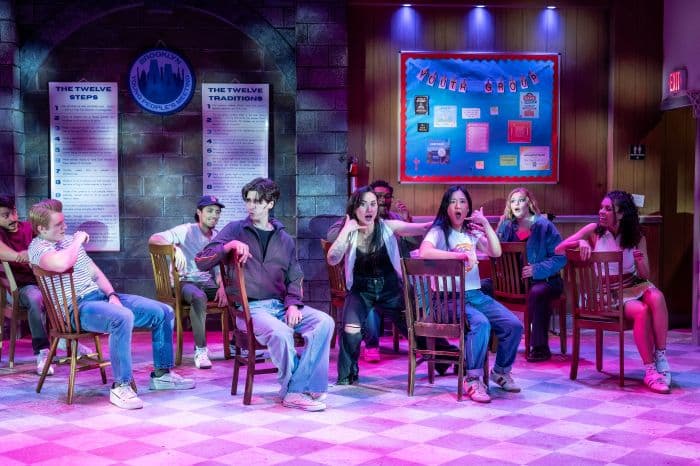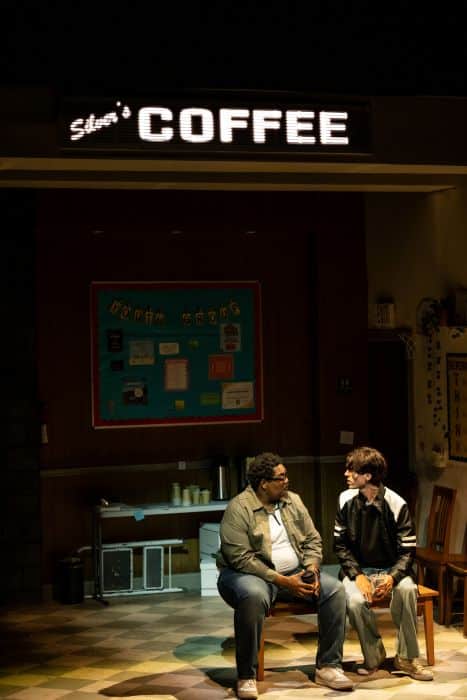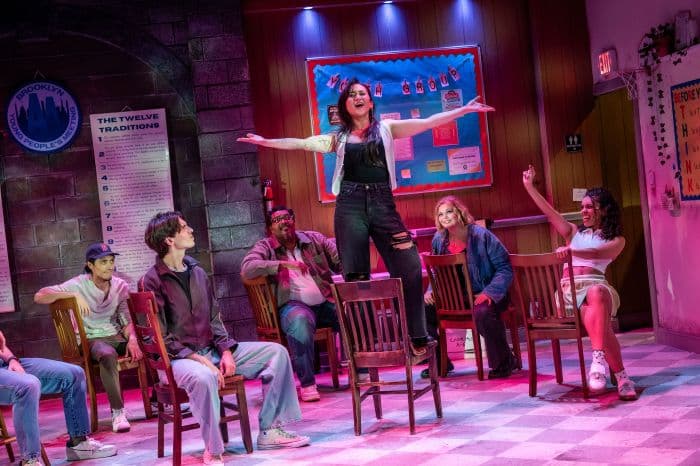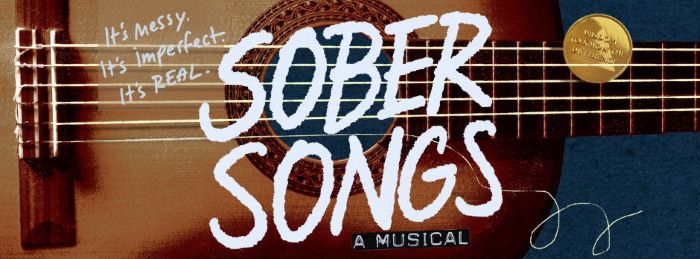Mark Twain is credited with giving writers the sound advice to “Write what you know,” and that’s what librettist, composer, and lyricist Michael Levin does with his musical Sober Songs, now playing a limited Off-Broadway engagement at Theatre Row. Inspired by his personal experiences with alcohol addiction, recovery, and sobriety, Levin presents the fictionalized journey of a group of young participants at a series of AA meetings, founded by their more mature leader Cap in the basement of a church in Brooklyn, to share his message of the transformative power of community and connection along the way, under the direction of Chris Mackin, who witnessed a similar struggle by his own loved ones. While the theme is relevant and the intent is heartfelt, the production, self-described as a musical dark comedy, often feels more like a checklist of theatrical clichés and stereotypes than a credible and compelling revelation.

A company of nine (Bernard Holcomb as Cap, Melanie Carrié as Angie, Henry Ryeder as Dean, Jason Fio as Roque, Jocelyn Darci Trimmer as Nina, Merrill Mitchell as Bri, with Lennie Disanto, Sarah Sun Park, and Jake Klevea as three unnamed members of the 12-step recovery meetings), backed by an unseen four-piece band (conductor Devon Wong on keyboard, Zachary Johnson on guitar, Eric Wharton on bass, and Mike Coiro on drums), relays the character-driven story through an introductory downstage line-up of the cast delivering corny one-liners about their troubled lives and backgrounds, 22 short songs in a mismatched array of genres (musical direction by Brian Reynolds), from rock-and-roll to country, blues, romantic ballads, and show tunes (and singer/actor/musician Dean’s acoustic guitar solos that are clearly not played by the on-stage performer but by the off-stage Johnson), choreography (by Megan Roe) that contains everything from chorus lines and jazz hands to dancing on chairs and hoedown stomping, and brief sketches of interactions that range from sharing at the meetings to conversations in a local coffee shop and other locales, sexual attractions to friendships, lapses in sobriety to angry confrontations, suicide and guilt to life-affirming advice from the knowing and supportive Cap, who also serves as the direct-address narrator.

The mood of the show and characters shifts from lighthearted and likeable in Act I, to tragic and unhinged, and ultimately encouraging, in Act II, with standout performances, powerful vocals, and fluid moves by Carrié’s Angie, estranged from her mother over her porn videos and in an evolving relationship with Dean, and Holcomb as Cap, whose “Hey, Hey, A.A.” is one of the most engaging and entertaining of the musical numbers, and whose acquired wisdom, espousal of the rules, format, and program of AA (e.g., everyone who speaks is required to state their name and the phrase “I’m an alcoholic”), and unfailing dedication as a sponsor offer the possibility of recovery if the troubled addicts will accept and follow it. In keeping with actual statistics, some do and some don’t.

Enhancing the story are realistic contemporary costumes (by Izzy Kitch) that define the characters and their changing states of sobriety and relapse (though a running joke about Roque unwittingly wearing a Red Sox baseball cap because he thinks the B stands for The Bronx is beyond belief). The set (by Joshua Warner) easily transitions from the church basement, where the meetings are held, to Silver’s Coffee, with the simple move-in of a bench and illumination of a sign above, to Dean’s dressing room, and atop the Brooklyn Bridge, represented by the low platform in the church basement via outdoor sound effects (by Travis Joseph Wright) and green lighting (by Annie Garrett-Larsen) at its edges to suggest the water below.
Levin’s look at recovery culture in Sober Songs rarely hits the raw psychological or emotional depths of addiction or the heights of dark comedy about it and often overstates the giddy jubilance of the AA meetings. It’s an attempt that needs more refinement of the book and songs (two of which were already cut at the press preview I attended), and a more seasoned company to deliver the complexities, suffering, and devastation that come with substance abuse and the much-needed humor to help alleviate some of its impact.
Running Time: Approximately two hours, including an intermission.

Sober Songs plays through Sunday, September 28, 2025, at Theatre Row, Theatre 3, 410 W 42nd Street, NYC. For tickets (priced at $76.50-96.50, including fees), call (212) 714-2891, go online, or find discount tickets at TodayTix.



